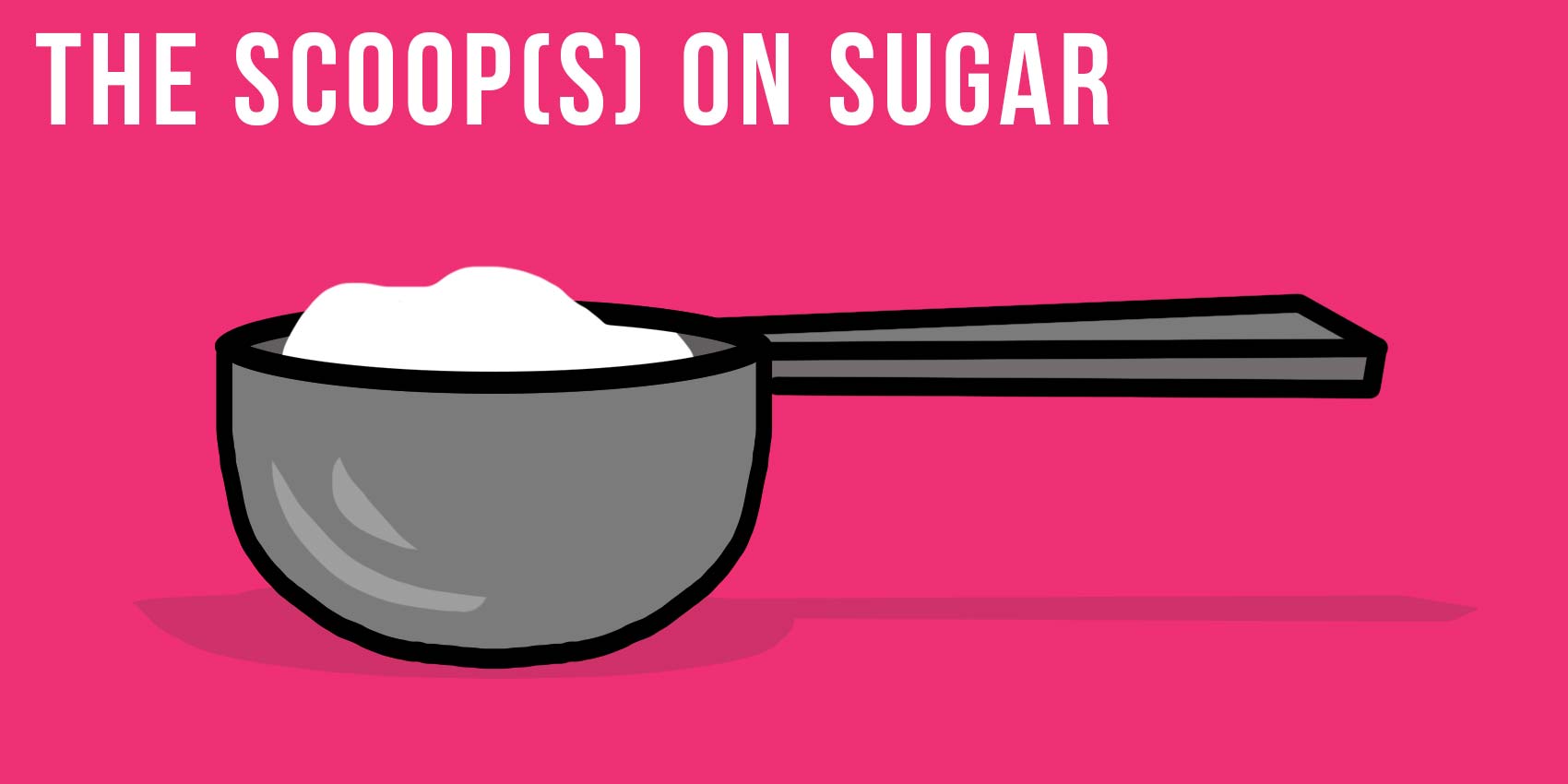15 Sep The scoop(s) on sugar

Guess how many teaspoons of sugar the American Heart Association recommends per day for women and for men. Got a number in mind? Is it 6 teaspoons for women and 9 for men? Good guess!
Now guess this: How many teaspoons a day do Americans actually consume? 22! In fact, the average can of soda has 10 teaspoons of sugar.
Indeed, the US Food and Drug Administration (FDA) recommends that Americans eat only about 50 grams of sugar total per day. Each teaspoon of sugar is 4.2 grams, so American consume almost double (1.85x) the recommended amount!
But just why are we told to limit the amount we have? After all, it tastes sooooo good. Here’s the scoop:
Refined sugar provides empty (non-nutritive) calories: that means you get no real nutritional value from eating sugar. In the refining process, sugar is stripped of ALL its vitamins and minerals. Then, after consuming it, we must use some of those very nutrients to metabolize it! So – the first scoop: It drains us of certain nutrients.
Next scoop: Refined sugar is often responsible for many common chronic complaints such as lack of energy, joint or muscle pains, headaches, sleep problems, and stomach complaints, such as bloating. In fact, if you remove sugar from your diet for just 2-3 weeks, you may be amazed to find that some of these long-standing symptoms will disappear.
Another big scoop: Sugar is highly addictive. The more sugar people have, the more they crave it. Unfortunately, to complicate this addiction, sugar is so readily available that it is not easy to remove from our diets. Refined sugar shows up in so many foods on the supermarket shelf – foods like spaghetti sauce, salad dressing, crackers, breads, canned soups and vegetables – that it’s hard to find food brands without added sugar. Reading labels is a good way to start—to educate yourself! Sugar is EVERYWHERE and it goes by many different names: high fructose corn syrup, dextrose, honey, glucose, sucrose, sorbitol, and brown sugar.

DID YOU KNOW? Refined sugars and dairy, along with chemical additives such as artificial colors and preservatives, are also suspected of negatively affecting children’s moods.
(Source: https://childdevelopmentinfo.com/psychology/adhd-add/five-foods-negatively-affect-childs-mood/#.WyF5ii2ZNZ0)
Unfortunately, calculating the total amount of added sugars in a food is difficult because food labels lump together BOTH naturally occurring sugars (okay to have) and added sugars (not so good to have). For example, the label claim on a container of PLAIN yogurt (which has NO ADDED sugar) may show a total of 16 grams sugar. The naturally occurring sugar in plain yogurt is lactose, which does not affect the body the way that most refined sugars may. Thus, it’s always best to read the ingredient label and look for the added sugars, especially ones such as high fructose corn syrup and dextrose, which are chemically altered (meaning changed) sugars and should be avoided.

TIP! When choosing a box of cereal or a snack, if sugar is among the first 3 ingredients, put it back on the shelf and make a difference choice.
One more big scoop: The highs and lows that come from eating too much sugar can affect your moods as well. Sugar gives you energy – so when you eat a lot of it you can get a sugar “high”—making you excited and perhaps even hyper. However, refined sugar burns quickly and so leaves the blood stream quickly, which causes a crash. This means you can often feel really fatigued or even depressed after that sugar high is gone (See “The zone” sub-post to read about this).
Kids often report headaches, stomaches, diarrhea, and feelings of anxiety and sadness after consuming a super sugary and chemical filled treat. Food has its effects on you, what effect do you choose?
If you think swapping sugar for artificial sweeteners (such as Aspartame and Sucralose) is a safe solution, sadly you are wrong. Artificial sweeteners are even more harmful than sugar and have been linked to several serious diseases such as obesity, heart disease, high blood pressure, and digestive issues like colitis and IBS (Irritable Bowel Syndrome), just to name a few. (Source: Science Daily, https://www.sciencedaily.com/releases/2017/07/170717091043.htm) So if you are having trouble controlling your moods, consider reducing your overall sugar intake. You are always better off adding a teaspoon of sugar to your unsweetened home-brewed iced tea than buying a diet Snapple!
No more scoops! I’m full!! Okay, then we’ll just sum up all the harmful effects of too much sugar over time:
obesity, high blood pressure, diabetes, heart disease, high cholesterol levels, liver disease, cavities, poor sleep, mood problems. Did we leave out any organ or part of the body not affected by sugar? Yeah, but you get the idea….
Let’s face facts: sugar tastes good! And eating is a great pleasure. So, how can you make healthy choices when it comes to sugar? After all, going through life eating plain, tasteless food is NOT what most people want. Read the next post for some tips.




Post Question:
Do you think you could be addicted to sugar? Why or why not?
Answer the post question here
What's being said